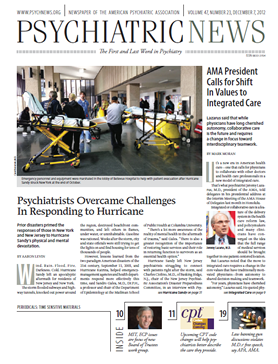As I prepare to assume the presidency next May, I have been reflecting on the value of belonging to APA for our members. I believe that membership in APA brings us all into a community of colleagues dedicated to the profession of psychiatric medicine and mental health care. We enjoy meetings meant to bring our members together and educate them so that they can actively consider and participate in defining the nature and directions of our field. We keep up to date through APA’s scientific journals, textbooks, newspapers, list serves, and continuing medical education activities. We propel the field forward by developing and supporting best practices and standards of care through research programs and education. Thanks to the productive collaborations between our elected leadership and APA staff, our programs have grown in breadth and depth over the years.
APA’s goal is to provide support to psychiatrists from “the cradle to the grave” beginning as medical students, during residency training, and through the latter stages of their careers. In this context, no constituency of APA is more important than our young members. Our members in training (MITs) and early career psychiatrists (ECPs) represent the future of our profession and health care providers to the millions of patients with mental disorders. Consequently, it is critical that we are attuned to the interests and needs of psychiatrists in the formative stages of their careers.
To ensure that APA is doing all it can to recruit and support MITs and ECPs, the Board of Trustees has commissioned a new work group—the Board of Trustees Ad Hoc MIT/ECP Work Group. It is chaired by ECPs Drs. Carolyn Rodriguez and Jonathan Amiel and is composed of 12 MIT and ECP participants who have been actively involved with APA and represent a diversity of backgrounds and career interests. Dr. Rodriguez is an NIH-funded clinical researcher who specializes in developing novel treatments for anxiety disorders, and Dr. Amiel is a community psychiatrist and medical educator who serves as assistant dean for curricular affairs at Columbia. In addition, APA past President Dr. Carol Bernstein and APA Director of Education Dr. Deborah Hales will serve as senior consultants to the group.
The MIT/ECP Work Group will work over the coming year to determine how to increase the enrollment in and value of APA membership for MITs and ECPs and identify reasons for possible attrition in the transition from training to early career status. One of the work group’s key activities will be to survey our MIT and ECP members to understand their interests and needs. Based on the results of the survey, the work group will then prepare recommendations for enhancing recruitment and retention of MITs and ECPs in APA. By next September’s APA components meeting, the work group will report its findings and recommendations to the Board of Trustees.
When I present the charge to the MIT/ECP work group at our kickoff meeting, I will also challenge these bright young people to incorporate novel ways to improve communication in the digital era. APA currently uses multiple streams of media (for example, podcast, print, Twitter, Facebook) to communicate with our members, and yet we are always seeking new opportunities to engage in bi-directional communication (rather than broadcasting) to ensure that we are keeping our members informed and responding to their needs. Our hope is that the MIT/ECP Work Group will engage MITs and ECPs in this dialogue, understand their challenges and their early career transitions, and propose action steps to bridge the gap.
I know that you will join me in wishing the work group members well in their important task and looking forward to their findings and recommendations. On behalf of APA, I thank them for taking on this important project. If you have any suggestions or contributions for the work group, please forward them to Drs. Rodriguez and Amiel at
[email protected].


